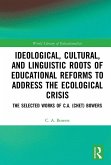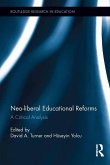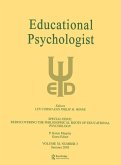C. A. Bowers
Ideological, Cultural, and Linguistic Roots of Educational Reforms to Address the Ecological Crisis (eBook, ePUB)
The Selected Works of C.A. (Chet) Bowers
43,95 €
43,95 €
inkl. MwSt.
Sofort per Download lieferbar

22 °P sammeln
43,95 €
Als Download kaufen

43,95 €
inkl. MwSt.
Sofort per Download lieferbar

22 °P sammeln
Jetzt verschenken
Alle Infos zum eBook verschenken
43,95 €
inkl. MwSt.
Sofort per Download lieferbar
Alle Infos zum eBook verschenken

22 °P sammeln
C. A. Bowers
Ideological, Cultural, and Linguistic Roots of Educational Reforms to Address the Ecological Crisis (eBook, ePUB)
The Selected Works of C.A. (Chet) Bowers
- Format: ePub
- Merkliste
- Auf die Merkliste
- Bewerten Bewerten
- Teilen
- Produkt teilen
- Produkterinnerung
- Produkterinnerung

Bitte loggen Sie sich zunächst in Ihr Kundenkonto ein oder registrieren Sie sich bei
bücher.de, um das eBook-Abo tolino select nutzen zu können.
Hier können Sie sich einloggen
Hier können Sie sich einloggen
Sie sind bereits eingeloggt. Klicken Sie auf 2. tolino select Abo, um fortzufahren.

Bitte loggen Sie sich zunächst in Ihr Kundenkonto ein oder registrieren Sie sich bei bücher.de, um das eBook-Abo tolino select nutzen zu können.
In this volume C.A. (Chet) Bowers, whose pioneering work on education and environmental and sustainability issues is widely recognized and respected around the world, brings together a carefully curated selection of his seminal work on these concerns and educational reforms to address the them.
- Geräte: eReader
- mit Kopierschutz
- eBook Hilfe
Andere Kunden interessierten sich auch für
![Ideological, Cultural, and Linguistic Roots of Educational Reforms to Address the Ecological Crisis (eBook, PDF) Ideological, Cultural, and Linguistic Roots of Educational Reforms to Address the Ecological Crisis (eBook, PDF)]() C. A. BowersIdeological, Cultural, and Linguistic Roots of Educational Reforms to Address the Ecological Crisis (eBook, PDF)43,95 €
C. A. BowersIdeological, Cultural, and Linguistic Roots of Educational Reforms to Address the Ecological Crisis (eBook, PDF)43,95 €![Inventions of Teaching (eBook, ePUB) Inventions of Teaching (eBook, ePUB)]() Brent DavisInventions of Teaching (eBook, ePUB)43,95 €
Brent DavisInventions of Teaching (eBook, ePUB)43,95 €![Educational Reform and Environmental Concern (eBook, ePUB) Educational Reform and Environmental Concern (eBook, ePUB)]() Dorothy KassEducational Reform and Environmental Concern (eBook, ePUB)41,95 €
Dorothy KassEducational Reform and Environmental Concern (eBook, ePUB)41,95 €![Neo-liberal Educational Reforms (eBook, ePUB) Neo-liberal Educational Reforms (eBook, ePUB)]() Neo-liberal Educational Reforms (eBook, ePUB)38,95 €
Neo-liberal Educational Reforms (eBook, ePUB)38,95 €![Rediscovering the Philosophical Roots of Educational Psychology (eBook, ePUB) Rediscovering the Philosophical Roots of Educational Psychology (eBook, ePUB)]() Rediscovering the Philosophical Roots of Educational Psychology (eBook, ePUB)17,95 €
Rediscovering the Philosophical Roots of Educational Psychology (eBook, ePUB)17,95 €![Citizenship and Education in Contemporary China (eBook, ePUB) Citizenship and Education in Contemporary China (eBook, ePUB)]() Citizenship and Education in Contemporary China (eBook, ePUB)40,95 €
Citizenship and Education in Contemporary China (eBook, ePUB)40,95 €![Art, EcoJustice, and Education (eBook, ePUB) Art, EcoJustice, and Education (eBook, ePUB)]() Art, EcoJustice, and Education (eBook, ePUB)44,95 €
Art, EcoJustice, and Education (eBook, ePUB)44,95 €-
-
-
In this volume C.A. (Chet) Bowers, whose pioneering work on education and environmental and sustainability issues is widely recognized and respected around the world, brings together a carefully curated selection of his seminal work on these concerns and educational reforms to address the them.
Dieser Download kann aus rechtlichen Gründen nur mit Rechnungsadresse in A, B, BG, CY, CZ, D, DK, EW, E, FIN, F, GR, HR, H, IRL, I, LT, L, LR, M, NL, PL, P, R, S, SLO, SK ausgeliefert werden.
Produktdetails
- Produktdetails
- Verlag: Taylor & Francis
- Seitenzahl: 264
- Erscheinungstermin: 4. Mai 2018
- Englisch
- ISBN-13: 9781351757973
- Artikelnr.: 56841669
- Verlag: Taylor & Francis
- Seitenzahl: 264
- Erscheinungstermin: 4. Mai 2018
- Englisch
- ISBN-13: 9781351757973
- Artikelnr.: 56841669
- Herstellerkennzeichnung Die Herstellerinformationen sind derzeit nicht verfügbar.
C. A. (Chet) Bowers taught at the University of Oregon and Portland State University, and was granted emeritus status in 1998. In retirement he was still active professionally, writing and giving invited talks at international conferences that focused on educational reforms promoting a more sustainable future. He was invited to speak at 42 universities in the United States, including Harvard and Stanford Universities. Invitations to speak at 41 universities in other parts of the world included the University of Trondheim, University of Zagreb, University of Queensland, University of Cape Town, Rhodes University, York University, University of Toronto, the Chinese University of Hong Kong, Trinity College (Dublin), Universidad Catolica Boliviana San Pablo, Swiss Foundation for Environmental Education, Seoul National University, and National Chung Hising University (Taiwan). Notably, he was asked by Vice-President Al Gore to be the featured speaker at a dinner/seminar (held at the Gore residence) on the influence of metaphorical thinking on environmental and technology policies. He was one of six Western scholars, along with the former Chinese Minister of Culture, invited to speak at the International Congress on Culture and Humanity in the New Millennium, sponsored by the government of Hong Kong and the Chinese University of Hong Kong. Bowers gave the John Dewey Memorial Lecture in 1982, and in 1991 was voted the most outstanding environmental faculty at the University of Oregon. In June 2016 he gave an invited talk at a major international conference on educational reforms that address the ecological crisis.
Contents 1. Where to Start in Addressing the Cultural/Linguistic Roots of
the Ecological Crisis: Challenging the Misconceptions Underlying Modern
Consciousness 2. The Cultural Aspects of the Ecological Crisis (A) An
Ecological Paradigm for Understanding Language Issues 3. The Relational and
Emergent Nature of Cultural and Natural Ecologies 4. Language Issues that
should be the Central Focus in Teacher Education and Curriculum Studies 5.
Why the George Lakoff and Mark Johnson Theory of Metaphorical Thinking
Fails to Address the Linguistic Issues Related to the Ecological Crisis 6.
The Cultural Construction and Uses of Data (B) The Cultural Commons 7. The
Political Economy of the Cultural Commons and the Nature of Sustainable
Wealth 8. The Cultural Mediating Role of the Teacher/Professor-Across the
Disciplines 9. Educational Reforms in an Era of Global Warming and Digital
Insecurities (C) Clarifying the Difference between Individual and
Ecological Intelligence 10. The Challenge Facing Educational Reformers:
Making the Transition from Individual to Ecological Intelligence 11.
Gregory Bateson's Contribution to Understanding Ecological Intelligence 12.
Rethinking Social Justice Issues within an Eco-Justice Conceptual and Moral
Framework (D) Critique of Technology 13. Educational Reforms that
Contribute to Democratizing the Uses of Digital Technologies 14. The
Digital Revolution and the Unrecognized Problem of Linguistic Colonization
15. Has the Authority of Data Consigned Wisdom to the Junk-Heap of History?
16. Is the Digital Revolution Driven by an Ideology? 17. Is the Digital
Revolution Sowing the Seeds of a Techno-Fascist Future?
the Ecological Crisis: Challenging the Misconceptions Underlying Modern
Consciousness 2. The Cultural Aspects of the Ecological Crisis (A) An
Ecological Paradigm for Understanding Language Issues 3. The Relational and
Emergent Nature of Cultural and Natural Ecologies 4. Language Issues that
should be the Central Focus in Teacher Education and Curriculum Studies 5.
Why the George Lakoff and Mark Johnson Theory of Metaphorical Thinking
Fails to Address the Linguistic Issues Related to the Ecological Crisis 6.
The Cultural Construction and Uses of Data (B) The Cultural Commons 7. The
Political Economy of the Cultural Commons and the Nature of Sustainable
Wealth 8. The Cultural Mediating Role of the Teacher/Professor-Across the
Disciplines 9. Educational Reforms in an Era of Global Warming and Digital
Insecurities (C) Clarifying the Difference between Individual and
Ecological Intelligence 10. The Challenge Facing Educational Reformers:
Making the Transition from Individual to Ecological Intelligence 11.
Gregory Bateson's Contribution to Understanding Ecological Intelligence 12.
Rethinking Social Justice Issues within an Eco-Justice Conceptual and Moral
Framework (D) Critique of Technology 13. Educational Reforms that
Contribute to Democratizing the Uses of Digital Technologies 14. The
Digital Revolution and the Unrecognized Problem of Linguistic Colonization
15. Has the Authority of Data Consigned Wisdom to the Junk-Heap of History?
16. Is the Digital Revolution Driven by an Ideology? 17. Is the Digital
Revolution Sowing the Seeds of a Techno-Fascist Future?
Contents 1. Where to Start in Addressing the Cultural/Linguistic Roots of
the Ecological Crisis: Challenging the Misconceptions Underlying Modern
Consciousness 2. The Cultural Aspects of the Ecological Crisis (A) An
Ecological Paradigm for Understanding Language Issues 3. The Relational and
Emergent Nature of Cultural and Natural Ecologies 4. Language Issues that
should be the Central Focus in Teacher Education and Curriculum Studies 5.
Why the George Lakoff and Mark Johnson Theory of Metaphorical Thinking
Fails to Address the Linguistic Issues Related to the Ecological Crisis 6.
The Cultural Construction and Uses of Data (B) The Cultural Commons 7. The
Political Economy of the Cultural Commons and the Nature of Sustainable
Wealth 8. The Cultural Mediating Role of the Teacher/Professor-Across the
Disciplines 9. Educational Reforms in an Era of Global Warming and Digital
Insecurities (C) Clarifying the Difference between Individual and
Ecological Intelligence 10. The Challenge Facing Educational Reformers:
Making the Transition from Individual to Ecological Intelligence 11.
Gregory Bateson's Contribution to Understanding Ecological Intelligence 12.
Rethinking Social Justice Issues within an Eco-Justice Conceptual and Moral
Framework (D) Critique of Technology 13. Educational Reforms that
Contribute to Democratizing the Uses of Digital Technologies 14. The
Digital Revolution and the Unrecognized Problem of Linguistic Colonization
15. Has the Authority of Data Consigned Wisdom to the Junk-Heap of History?
16. Is the Digital Revolution Driven by an Ideology? 17. Is the Digital
Revolution Sowing the Seeds of a Techno-Fascist Future?
the Ecological Crisis: Challenging the Misconceptions Underlying Modern
Consciousness 2. The Cultural Aspects of the Ecological Crisis (A) An
Ecological Paradigm for Understanding Language Issues 3. The Relational and
Emergent Nature of Cultural and Natural Ecologies 4. Language Issues that
should be the Central Focus in Teacher Education and Curriculum Studies 5.
Why the George Lakoff and Mark Johnson Theory of Metaphorical Thinking
Fails to Address the Linguistic Issues Related to the Ecological Crisis 6.
The Cultural Construction and Uses of Data (B) The Cultural Commons 7. The
Political Economy of the Cultural Commons and the Nature of Sustainable
Wealth 8. The Cultural Mediating Role of the Teacher/Professor-Across the
Disciplines 9. Educational Reforms in an Era of Global Warming and Digital
Insecurities (C) Clarifying the Difference between Individual and
Ecological Intelligence 10. The Challenge Facing Educational Reformers:
Making the Transition from Individual to Ecological Intelligence 11.
Gregory Bateson's Contribution to Understanding Ecological Intelligence 12.
Rethinking Social Justice Issues within an Eco-Justice Conceptual and Moral
Framework (D) Critique of Technology 13. Educational Reforms that
Contribute to Democratizing the Uses of Digital Technologies 14. The
Digital Revolution and the Unrecognized Problem of Linguistic Colonization
15. Has the Authority of Data Consigned Wisdom to the Junk-Heap of History?
16. Is the Digital Revolution Driven by an Ideology? 17. Is the Digital
Revolution Sowing the Seeds of a Techno-Fascist Future?







